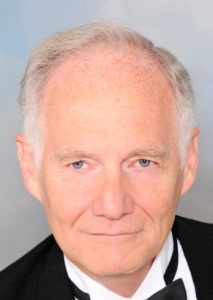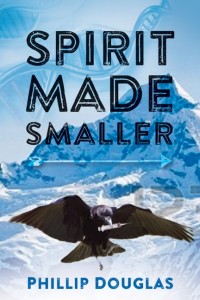
The following is a guest post by Douglas Phillip, author of Spirit Made Smaller. If you would like to write a guest post on my blog, please send me an e-mail at contact@cecilesune.com.
Why do we read, blog, and tweet? We hunger for connection and meaning. We crave to make sense of the world – past, present, and future. We choose to research the meaning and meaninglessness of modern existence…explore the dilemmas of our world and our place within it. Although ever-changing, our collective knowledge and the languages that we use to express the universe and humanity’s position within it shall always limit our comprehension because death comes to us all. Ultimately each of us, like Socrates and the Buddha, is a “non-knower” who suffers poverty, failure, exile, and loss. But we still search for understanding and search yet again…
Storytelling helps us out. Speculative fiction speaks to the anxieties percolating in its age. Indeed, storytellers who have researched their novels extremely well do restore some order to the world. They offer up material worthy of their potential readers’ time and money.
Whether in fiction, science, or other non-fiction endeavors, the first rule I try to follow when undertaking research is to acknowledge my inherent preferences and their limiting influences upon my imagination and the subsequent selection of background facts that will anchor the writing’s core themes.
Before I started my novel, Spirit Made Smaller, I had to recognize that I, as a human being, had four basic inclinations, or biases, which constricted my ideas:

First, I tend to anthropomorphize all animals, forces, and manmade machines. Placing human characteristics into non-human entities can turn away from truer comprehensions of actual creatures, conditions, or situations. Of course, the opposite in bestowing human attributes upon other species or natural forces such as thunder and hurricanes does help to shape those entities and create a sense of psychological satisfaction or relief, however mythical. Even more so, all the fine poetry, literature, and cinematic films predicated upon variations of artificial intelligence and diverse science fictions and fantasy projections of the human psyche would not have been created had not those intrepid authors and screenwriters employed this bias. Yet to this day science or metaphysics, however, cannot explain how and why human consciousness exists. If we cannot understand our own consciousness, how then may we hope to eventually chip it into a computer?
Second, I am inclined to look skyward for potential natural explanations instead of under my feet. Every day I view the sun, moon, and stars. So I prefer to search for meaning in the heavens rather than out of the center of the earth despite the occasional earthquake. Yet when I had forced myself to think about all the heat generated within the earth’s core and how it escaped through shifting tectonic plates on the planet’s surface, it was only then that I had effectively molded one my secondary characters in my recently released novel, Spirit Made Smaller.
Third, because I grew up in western Montana, I am biased toward accepting events happening on land being more significant for our world than the ever changing conditions that had manifested throughout the world’s oceans. Since the Earth’s surface remains 79% ocean compared to 21% land, it made sense to me to study the science of oceanography for critical background in my last book as well as writing my current novel. From an introductory course, I learned that the entire ocean floor turns over every 190 million years – this has happened at least twenty times since our planet was formed. Yet there are some surface land features which have lethargically existed for longer than three billion years. Obviously, the primary geological activity that happens on our planet, overall, is in the oceans and not on the continents. Thus, any theory regarding overall planetary surface and atmospheric conditions must account for the oceans providing the major driving component or it is worthless.

Last, I have known only carbon-based life forms – perhaps this is the most fundamental bias that we all possess. Asking the following question ended one of my bouts with writer’s block: “Do non-carbon based, sentient life forms exist within our galaxy?” Oh, the research I’ve done trying to answer that one…! And I’m doubly thankful for my college degree in chemistry.
When I remind myself about my core biases, my research becomes less inclined to employ confirmation bias — where I only select a few pieces of information and then leap to some faraway disaster, conspiracy theory, or Armageddon. The philosopher Thomas Kuhn pointed out that individuals often simply ignore facts that don’t fit their existing paradigms – yet the intellectually courageous person is willing to look at things that are surprisingly hard to look at. Thus, such a reasonable framework guides the background research that buttresses my characters and plots into broader landscapes about ascents and setbacks, forgiveness and redemption, and the back-and-forth, easy movements from the close-ups to the horizons.
Yet biases are indeed fundamental to conflict…and conflict creation and resolution are the DNA double helixes of fiction writing. Biases do have their critical places in creating a novel. I try to be aware of my core biases and realize that there is a time and a place to employ them and to reject them. As an editor once told me, “The wise writer knows when to anthropomorphize an object, force, or species, and when not to.” I agree.
About the author and his work: Douglas Phillip’s Website.